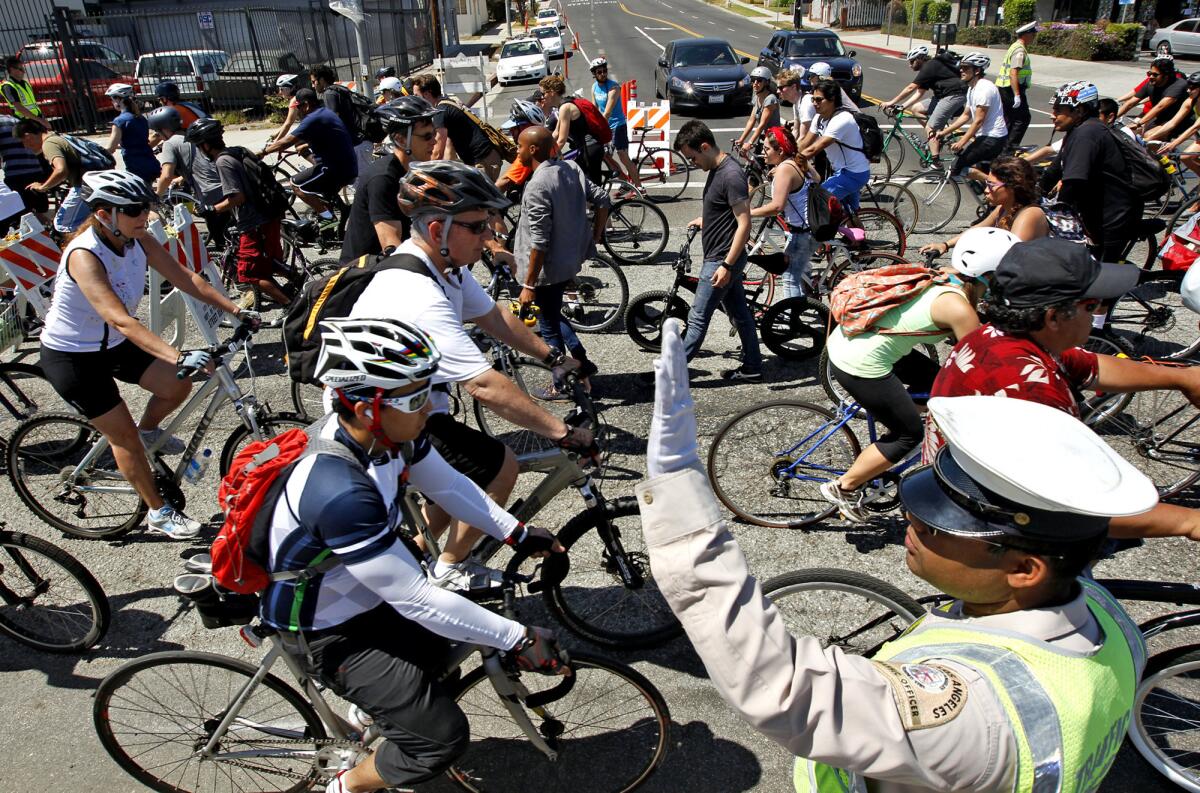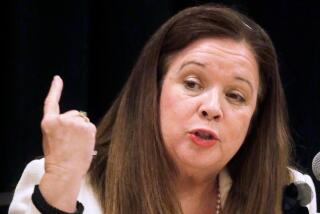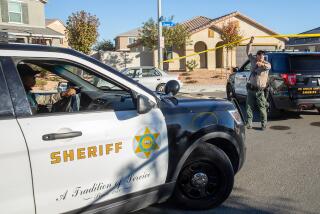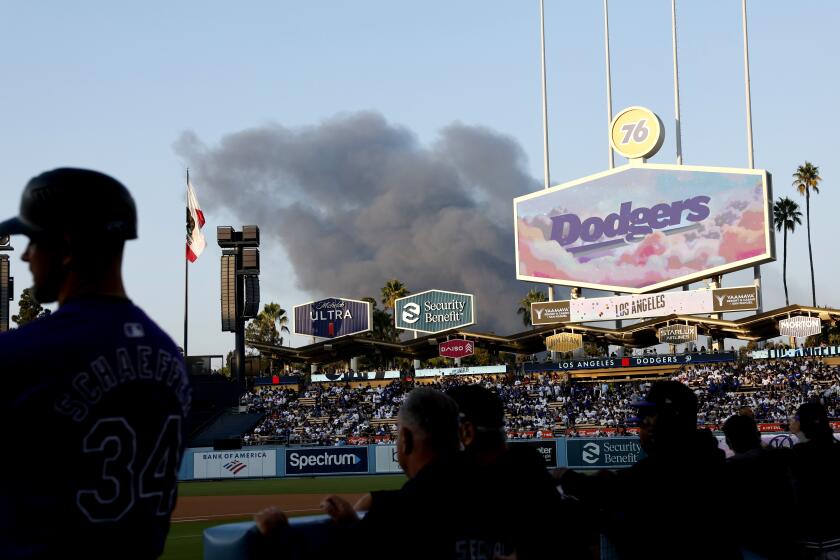L.A. fails to collect from Oscars and other events for officer overtime pay, audit finds

A traffic officer directs bicyclists on Venice Boulevard during a CicLAvia event in 2013. An audit released Wednesday found the Transportation Department had not been reimbursed for $1.8 million in overtime from special events.
Los Angeles traffic officers and other city employees have long made extra money by picking up overtime shifts for Hollywood award shows, music festivals and other major events. But a critical new audit has renewed concerns that taxpayers unwittingly subsidize what are often commercial enterprises because the city is not fully reimbursed for the services it provides.
In a single 12-month period ending last summer, the city’s transportation department lost as much as $1.8 million because poor bookkeeping made it impossible to track how much the agency was owed for special event overtime, according to an audit released this week by City Controller Ron Galperin.
In addition, auditors found indications that traffic control officers combined sick time and special event overtime hours to maximize their pay. Some employees took sick days, Galperin said, then showed up after the regular workday for a more lucrative time-and-a-half shift. One officer called in sick three days in a row but worked 15 hours at events in the same period, earning 46 1/2 hours of pay.
“This seems to us to be an abuse of what sick time is supposed to be,” Galperin spokesman Lowell Goodman said. “You’re obviously not sick if you’re showing up to direct traffic at the Dodgers game.”
The department’s record-keeping for event reimbursements was “so shoddy that it’s impossible for us to say things with certainty,” Goodman said. In many cases, the Transportation Department and the Bureau of Street Services never sent invoices or failed to ensure event sponsors had paid in full.
The city has identified some outstanding bills and sent them to collection agencies. One involves allegedly non-reimbursed charges for the Academy Awards, auditors said.
An Academy spokesman said the industry group only learned of the city bill last week. “We were unaware of any unpaid invoices,” Daniel Gomez wrote in an email to The Times. “We’re currently investigating the issue with the City of Los Angeles.”
Whether and how much the taxpayers should contribute to private events such as festivals, concerts and memorial services is a perennial question for policymakers.
In 2009, Los Angeles paid $3.2 million to police and cleanup crews after Michael Jackson’s memorial service at Staples Center. The decision sparked criticism from taxpayers, in part because the city was facing a $400-million budget shortfall. The Anschutz Entertainment Group, which runs Staples Center, later agreed to donate $1 million to the city’s general fund to partially defray the cost.
For recurring events in 2013 and 2014, such as Dodgers games and shows at the Hollywood Bowl, Galperin said the Transportation Department miscalculated how much it paid its own employees, and subsequently under-billed the venues by almost $150,000.
The agency’s general manager, Seleta Reynolds, said a new system is allowing better tracking of overtime hours and reimbursements received from event sponsors.
Some collections for special-event costs are processed by the Bureau of Street Services, which oversees street closures for block parties and races. There is a chance the bureau can still recover some “but not all” of the $1.8-million potential loss cited by Galperin, transportation spokesman Bruce Gillman said.
The audit also raised various concerns about management of overtime, including whether the premium shifts were fairly distributed. Employees are selected for special events based on seniority, the audit said, but can trade their shifts without approval from a supervisor.
In interviews, employees told auditors that a “select few employees with insider relationships” — dubbed “the Cartel” by some workers — received coveted overtime slots. Traffic officers who “know how to network” and treated overtime as “a privilege that can be traded” could land a disproportionate share of extra-pay shifts, the audit said.
In the 2013-14 fiscal year studied by Galperin’s office, the majority of the department’s 544 traffic officers and supervisors received less than $10,000 in overtime. But 14 earned more than $50,000, and four earned more than $75,000, the audit said.
Bob Schoonover, president of the union that represents traffic officers, said excessive use of overtime did not surprise him because the department has been “understaffed for too long.” He added that the department has a responsibility to “balance the burden of overtime among those who are available and willing to take it on.”
The Transportation Department is second only to the Los Angeles Fire Department in the proportion of paid overtime compared with base salaries. In 2013-14, 12% of transportation employees’ pay came from overtime. Across all city departments, that figure is closer to 7%.
A month ago, an audit of a different Transportation Department division found “staggering” amounts of overtime that cost the city $3.3 million in a single year. Almost half the 67 employees in the division that paints road stripes and installs street signs claimed more than 1,000 hours of overtime in 2013-14, or an average of about 19 hours for every week of the year.
For more Los Angeles transportation news, follow @laura_nelson on Twitter.
More to Read
Sign up for Essential California
The most important California stories and recommendations in your inbox every morning.
You may occasionally receive promotional content from the Los Angeles Times.











